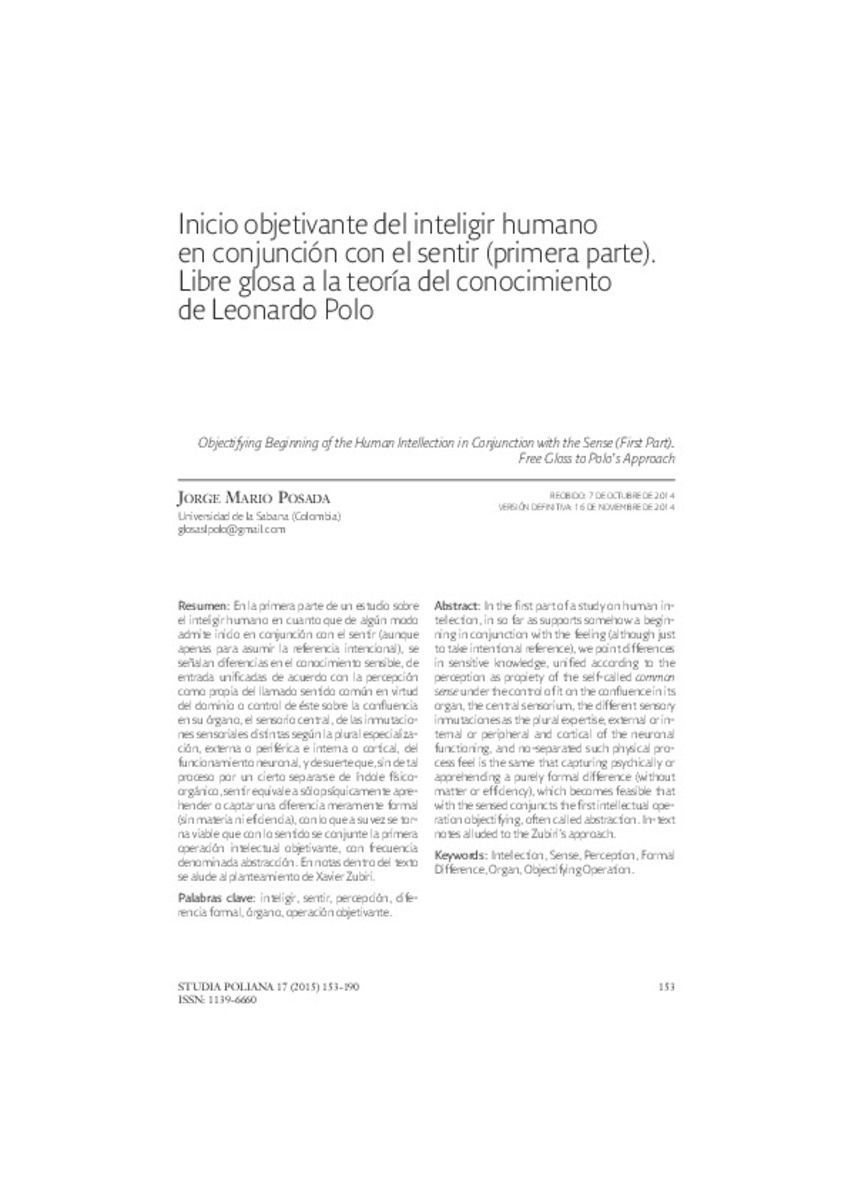Full metadata record
| DC Field | Value | Language |
|---|---|---|
| dc.creator | Posada, J.M. (Jorge Mario) | - |
| dc.date.accessioned | 2017-02-06T11:36:02Z | - |
| dc.date.available | 2017-02-06T11:36:02Z | - |
| dc.date.issued | 2015 | - |
| dc.identifier.citation | Mario Posada, Jorge; ""Inicio objetivante del inteligir humano en conjunción con el sentir (primera parte). Libre glosa a la teoría del conocimiento de Leonardo Polo"". en Studia Poliana. 17, 2015, 153-190 | es_ES |
| dc.identifier.issn | 1139-6660 | - |
| dc.identifier.uri | https://hdl.handle.net/10171/42958 | - |
| dc.description.abstract | En la primera parte de un estudio sobre el inteligir humano en cuanto que de algún modo admite inicio en conjunción con el sentir (aunque apenas para asumir la referencia intencional), se señalan diferencias en el conocimiento sensible, de entrada unificadas de acuerdo con la percepción como propia del llamado sentido común en virtud del dominio o control de éste sobre la confluencia en su órgano, el sensorio central, de las inmutaciones sensoriales distintas según la plural especialización, externa o periférica e interna o cortical, del funcionamiento neuronal, y de suerte que, sin de tal proceso por un cierto separarse de índole físicoorgánico, sentir equivale a sólo psíquicamente aprehender o captar una diferencia meramente formal (sin materia ni eficiencia), con lo que a su vez se torna viable que con lo sentido se conjunte la primera operación intelectual objetivante, con frecuencia denominada abstracción. En notas dentro del texto se alude al planteamiento de Xavier Zubiri. | es_ES |
| dc.description.abstract | In the first part of a study on human intellection, in so far as supports somehow a beginning in conjunction with the feeling (although just to take intentional reference), we point differences in sensitive knowledge, unified according to the perception as propiety of the self-called common sense under the control of it on the confluence in its organ, the central sensorium, the different sensory inmutaciones as the plural expertise, external or internal or peripheral and cortical of the neuronal functioning, and no-separated such physical process feel is the same that capturing psychically or apprehending a purely formal difference (without matter or efficiency), which becomes feasible that with the sensed conjuncts the first intellectual operation objectifying, often called abstraction. In-text notes alluded to the Zubiri’s approach. | es_ES |
| dc.language.iso | spa | es_ES |
| dc.publisher | Servicio de Publicaciones de la Universidad de Navarra | es_ES |
| dc.rights | info:eu-repo/semantics/openAccess | es_ES |
| dc.subject | inteligir | es_ES |
| dc.subject | sentir | es_ES |
| dc.subject | percepción | es_ES |
| dc.subject | diferencia formal | es_ES |
| dc.subject | órgano | es_ES |
| dc.subject | operación objetivante | es_ES |
| dc.subject | Intellection | es_ES |
| dc.subject | Sense | es_ES |
| dc.subject | Perception | es_ES |
| dc.subject | Formal Difference | es_ES |
| dc.subject | Organ | es_ES |
| dc.subject | Objectifying Operation | es_ES |
| dc.title | Inicio objetivante del inteligir humano en conjunción con el sentir (primera parte). Libre glosa a la teoría del conocimiento de Leonardo Polo | es_ES |
| dc.title.alternative | Objectifying Beginning of the Human Intellection in Conjunction with the Sense (First Part). Free Gloss to Polo’s Approach | es_ES |
| dc.type | info:eu-repo/semantics/article | es_ES |
| dc.identifier.doi | 10.15581/013.1426 | es_ES |
Files in This Item:
Statistics and impact
Items in Dadun are protected by copyright, with all rights reserved, unless otherwise indicated.






